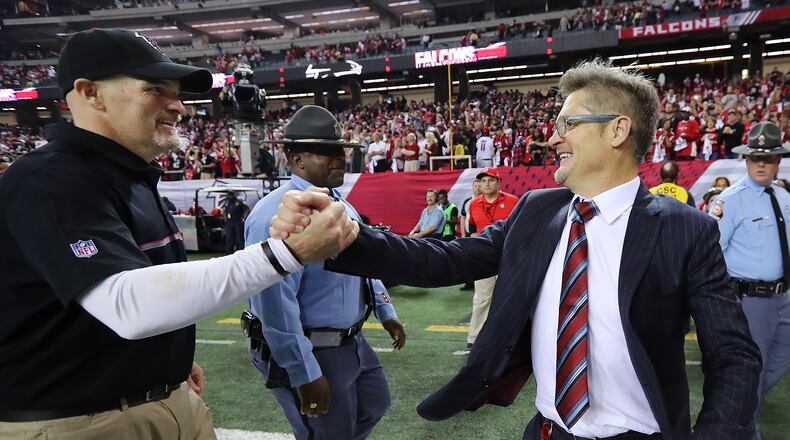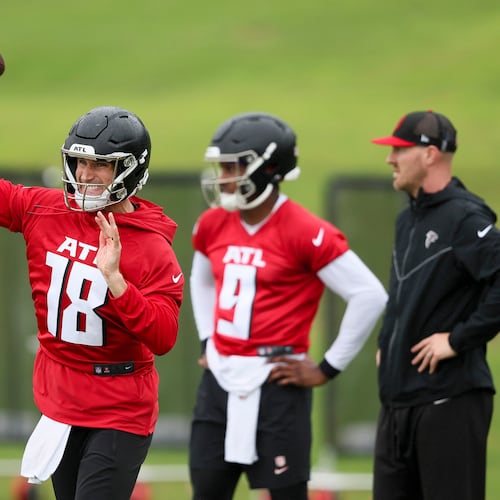Welcome inside the gates of the Falcons’ training facility, where it seems everyone speaks in Bro-mides.
It is an idyllic place where every player is on the All-Bro team.
Where from the front office to the coaches’ warren to the locker room all the way to the equipment room, everyone is engaged in one communal Bro-mance.
And even that is not enough for the Falcons coach who came here intent upon convincing his people that they are more than mercenaries who dress alike. Rather they must come together and form that almost unheard of unit — a family that actually gets along.
For after Saturday’s playoff victory over Seattle, Dan Quinn expanded his vision to everyone inside the Georgia Dome. Those 71,000 fans who split the air with their voices were, “no doubt a huge part of our brotherhood,” quoth the coach.
This brotherhood is growing geometrically. For Sunday’s NFC Championship game, might it now include every citizen from Valdosta to Blue Ridge?
It is impossible to spend any time around Quinn without feeling the heat of his belief in football as family. His enthusiasm for the common struggle is the one constant amid all the variables of a season. He is more upbeat than an infomercial. More of a bonding agent than Gorilla Glue.
“Forever I’ve loved being a part of really connected, good teams,” said Quinn, who picked up much of this approach from his old boss in Seattle, Pete Carroll. “I knew for us to play at our best we have to be really close in the locker room, and that carries over onto the field.
“Then it’s up to the players to see how far they can take that connection. For this team to connect the way they have — the unconditional support that they have for one another — it’s legit. You can feel it. Having that unselfish attitude. Knowing I want to ball out for that guy right next to me. When you’re playing for something bigger than yourself it’s a really good feeling. I’m glad that they’ve captured that.”
As part of trying to build that attitude, there was the redesign of the locker room this season that cleared space for pingpong tables and a common seating area — anything to stimulate camaraderie. Locker assignments were scrambled so players would be forced to interact outside their position group. When a Navy SEAL speaker visited before the season, it was to preach the values of working together as a family.
And, then there are the constant references to the Falcons not as a team, but as a “brotherhood.” It is a word, fullback Patrick DiMarco said, he hears five or six times a day. “Not always (from Quinn),” he said. “It’s true within the team. You hear it player-to-player, coach-to-player, coach-to-coach. It’s alive everywhere.”
Such a sprawling concept that no one word can contain it. At midseason DiMarco got a little confused and carried away and yelled out, “Brothership!” at the end of a team prayer. That one made the rounds for a while. It was a quirky variant that never got quite as much traction as it should have.
For it is “The Hood” — as in brotherhood — that adorns the caps most commonly worn around these parts.
This fraternal Falcons thing wasn’t quite such a big theme in Quinn’s first season in Atlanta, when the Falcons got out fast, but lost seven of their last nine. No one much cared how close they were in their shared misery. But now that they are the toast of the NFC and owners of an offense so fast and flashy that Hendrick Motorsports must be jealous, much credit is going to the intangible of team unity.
The bonding began months before the season, at the end of March, most appropriately inspired by those on offense. That’s when quarterback Matt Ryan gathered 27 players in Fort Lauderdale for a three-day informal passing camp (on his dime). They’d bus from their beachfront hotel to a private high school where they ran drills and worked out for four or five hours, leaving the rest of the day to get better acquainted.
“It kind of started our season off, not only us getting work done on the field, but also getting that camaraderie and that brotherhood that we’ve kind of built here,” tight end Levine Toilolo said.
So, did Ryan, who remembered how players developed ties when working out on their own during the lockout of 2011, get his money’s worth?
“I think there was a lot of value to that,” he said. “We had a lot of new guys in the building, and younger guys. Developing close relationships and getting to know each other personally and professionally is really important to creating an atmosphere that is conducive to winning.
“I thought that was a really good start, a really good kickoff to our season. … I think that has helped us develop a closeness and a bond that has been really strong the entire year.”
A question inevitably arises whenever a team sends the message about how close it is, how “the chemistry” is so beneficial to the bottom line is: Does any of that really matter in the often cynical world of professional sports?
And you have to wonder whether a team is close because it’s winning, or winning because it’s close?
The Falcons answer with feeling.
Wide receiver Julio Jones: “(The team bond) is why I feel like we are a better team now. A lot of people say, ‘All right, go out here and play for this guy.’ But we really do it.”
DiMarco: “To me, it takes you back to your high school days, as corny as it may sound. Although we haven’t known each other long we have that tight relationship, and it was developed quickly. In high school you’re playing with your childhood friends you’ve played with since Pop Warner ball. I feel like we get that same fight here in the NFL with these guys. You’re going to lay it all on the line for your brother.”
Fifteen-year veteran defensive lineman Dwight Freeney: “You can become close because you’re good. But if you’re close already, that can make you good. It works both ways. But when you have a close-knit situation and then you’re good, that’s like an avalanche that you can’t stop.”
So here come the Falcons, surfing this communal avalanche as it sweeps up everyone in its path on the way to a very important final game in the Georgia Dome.
Oh, brother.
About the Author
Keep Reading
The Latest
Featured


